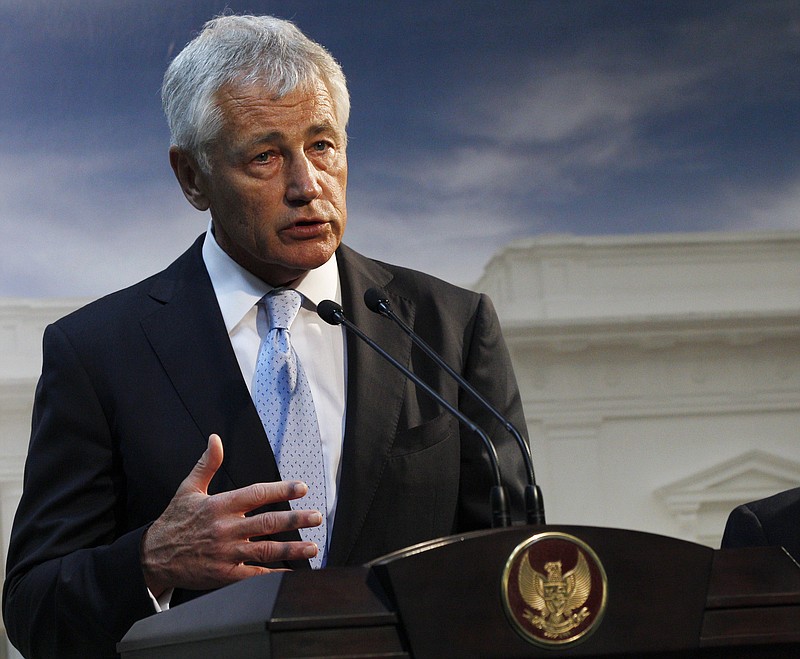WASHINGTON (AP) - U.S. military forces stand ready to strike Syria at once if President Barack Obama gives the order, Defense Secretary Chuck Hagel said Tuesday as the United States prepared to declare formally that chemical weapons had been used in the Syrian civil war.
U.S. officials said growing intelligence pointed strongly toward Bashar Assad's government as the culprit - a claim Assad called "preposterous." There were cautions from the White House that the goals of any military action would be measured, not intended to drive Assad from power.
"The options we are considering are not about regime change," said White House spokesman Jay Carney.
The U.S., along with allies in Europe, appeared to be laying the groundwork for the most aggressive response since Syria's civil war began more than two years ago. The White House said Obama had not settled on what action to take in response to the large-scale use of deadly gases, a move Obama said last year would cross a red line.
Officials had planned to release an intelligence report Tuesday more formally linking Assad to the attack, but that release appeared to be pushed back until later in the week. Still, the White House dismissed as "fanciful" the notion that anyone other than Assad could be to blame.
Vice President Joe Biden said there was no question Assad was responsible for the attack, becoming the highest ranking U.S. official to say so. He said the Syrian government is the only actor in the conflict that possesses chemical weapons and can deliver them.
A U.S. official said some of the evidence includes signals intelligence - information gathered from intercepted communications. The U.S. assessment is also based on the number of reported victims, the symptoms of those injured or killed and witness accounts.
It's unlikely international military action would begin before Thursday. That's when British Prime Minister David Cameron will convene an emergency meeting of Parliament where lawmakers are expected to vote on a motion clearing the way for a British response to the chemical weapons attack.
International support was growing. In Paris, President Francois Hollande said Tuesday that France is "ready to punish those who took the heinous decision to gas innocents." And the Arab League, a 22-member body dominated by Saudi Arabia and Qatar, also called for justice, laying blame for the attack on the Syrian government.
Obama discussed the situation in Syria on Tuesday with Prime Minister Stephen Harper of Canada, a NATO ally. The president has also spoken with Cameron, Hollande and Australian Prime Minister Kevin Rudd in recent days, and Vice President Joe Biden spoke Tuesday with Britain's deputy prime minister, Nick Clegg.
Officials said the international community was considering action that would punish Assad for deploying deadly gases, not sweeping steps aimed at ousting the Syrian leader or strengthening rebel forces. The focus of the internal debate underscores the scant international appetite for a large-scale deployment of forces in Syria and the limited number of other options.
The most likely military response would involve sea-launched cruise missile attacks on Syrian military targets. The White House is also studying legal justifications for taking such steps without approval from the United Nations, where Russia is certain to block action at the Security Council.
Italy, meanwhile, is insisting any strike should be authorized by the Security Council.
Hagel told BBC television on Tuesday that the Defense Department has "moved assets in place to be able to fulfill and comply with whatever option the president wishes to take."
The Navy has four destroyers in the eastern Mediterranean Sea within range of targets inside Syria. The U.S. also has warplanes in the region.
"We are ready to go," Hagel said.
Hagel said "to me it's clearer and clearer" that the Syrian government was responsible, but the Obama administration was waiting for intelligence agencies to make that determination.
On Monday, Secretary of State John Kerry issued a blistering rebuke of the Assad government's actions.
"By any standard, it is inexcusable and - despite the excuses and equivocations that some have manufactured - it is undeniable," he said.
The Obama administration was moving ahead even as a United Nations team already on the ground in Syria collected evidence from last week's attack. The U.S. said Syria's delay in giving the inspectors access rendered the U.N. investigation meaningless and the Obama administration had its own intelligence confirming chemical weapons use.
It's unlikely that the U.S. would launch a strike against Syria while the United Nations team is still in the country. The administration may also try to time any strike around Obama's travel schedule - he's due to hold meetings in Sweden and Russia next week - in order to avoid having the commander in chief abroad when the U.S. launches military action.
The president has ruled out putting American troops on the ground in Syria and officials say they are not considering setting up a unilateral no-fly zone.
On Capitol Hill, bipartisan support for a military response appeared to be building, with some key lawmakers calling for targeted strikes. A spokesman for House Speaker John Boehner said the Ohio Republican had "preliminary communication" with White House officials about the situation in Syria and a potential American response.
However, some lawmakers from both parties were calling on the president to consult Congress before moving forward. Republican Rep. Scott Rigell of Virginia is asking colleagues to sign a letter to the president urging him to reconvene Congress and seek approval for any military action.

